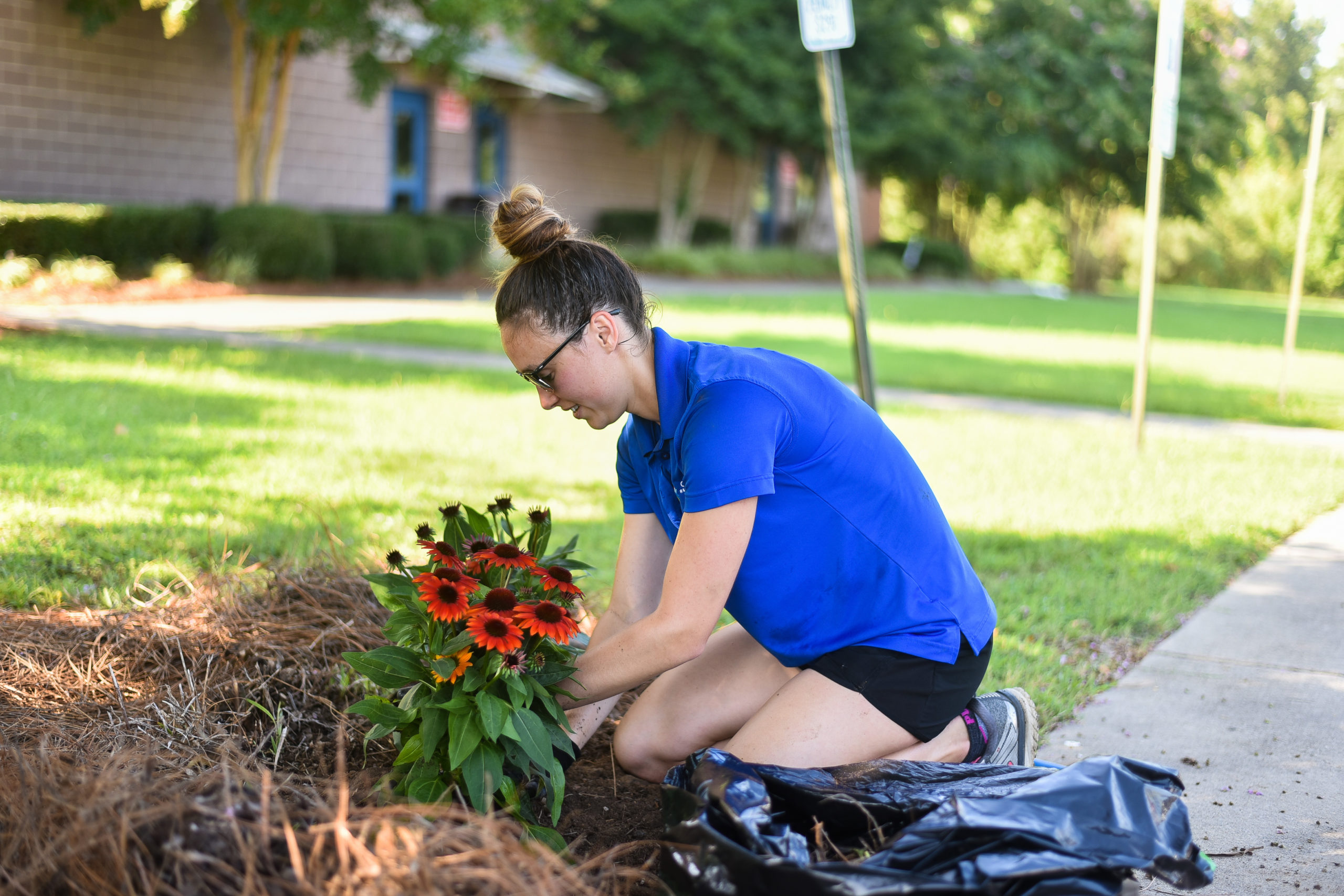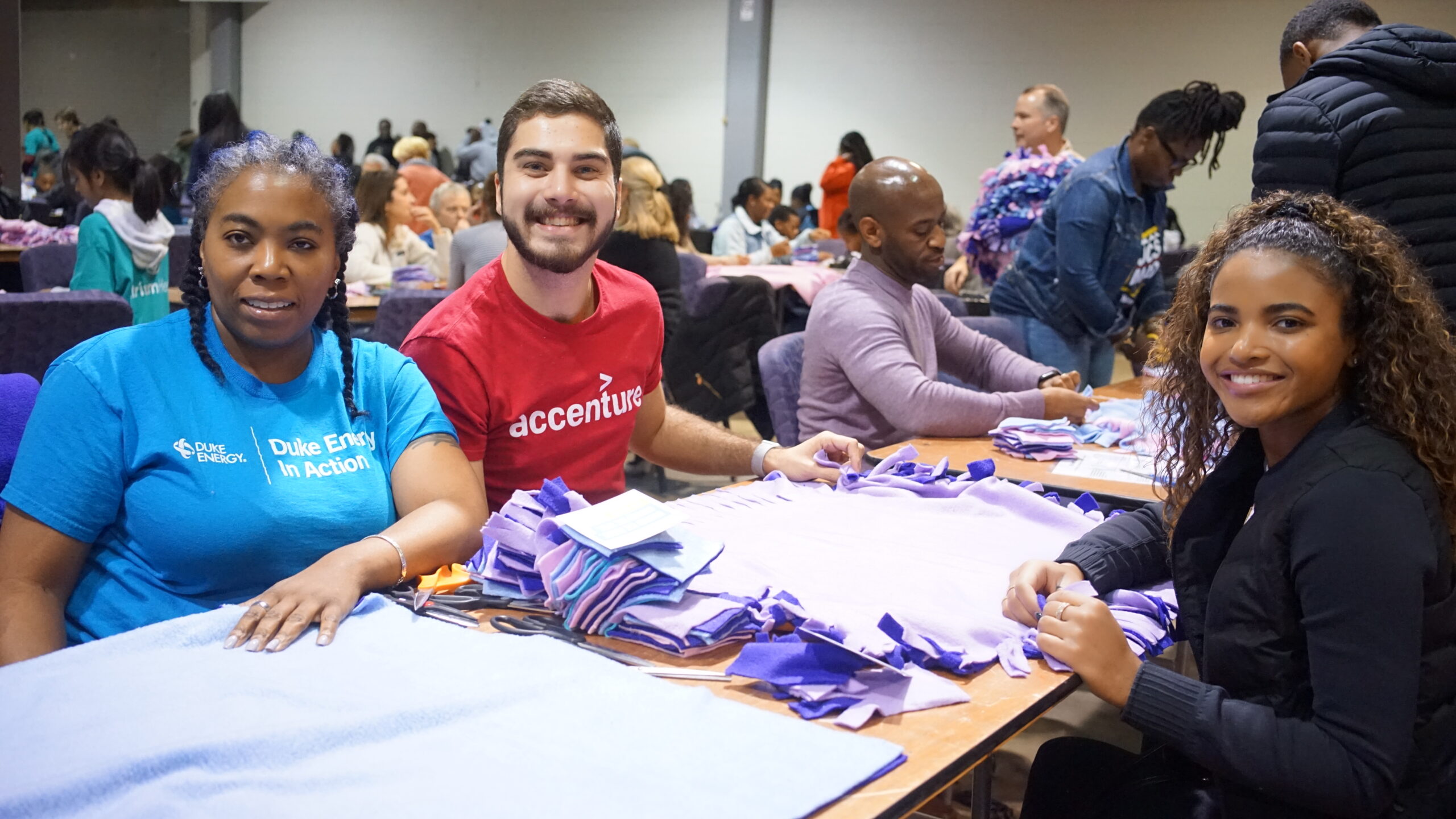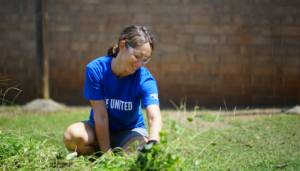
The Evolution of Volunteering Through the Pandemic
On a Saturday in January 2020, United Way of Central Carolinas hosted its annual MLK Call to Service, engaging 1,000 volunteers who answered the call to give back to the greater Charlotte community while celebrating the life, legacy and vision of Dr. Martin Luther King, Jr.
The event was held in partnership with The Park Church at The Park Expo & Conference Center in Charlotte. It featured a variety of hands-on service-learning projects and educational activities for children, individuals, families and groups.
Volunteers, inclu ding employees from companies like Duke Energy and Atrium Health, sat together at tables in the conference center to complete projects such as creating number and alphabet flash cards for Classroom Central, writing encouragement cards for Love In Action Project, assembling no-sew baby blankets for Baby Bundles and designing bookmarks for Promising Pages.
ding employees from companies like Duke Energy and Atrium Health, sat together at tables in the conference center to complete projects such as creating number and alphabet flash cards for Classroom Central, writing encouragement cards for Love In Action Project, assembling no-sew baby blankets for Baby Bundles and designing bookmarks for Promising Pages.
Overall, it was an impactful day. Nonprofit organizations received needed resources and volunteers left reflecting on the meaning of Dr. King’s life of service.
Two short months later, the COVID-19 pandemic hit communities across the nation, impacting every aspect of daily life. As stay-at-home orders were issued and schools and businesses temporarily closed, our own community experienced the tension and strain of an unpredictable and volatile environment.
At the height of the pandemic, grocery store shelves were empty, and charitable food organizations were overwhelmed. Volunteers were sent home due to safety concerns around a new concept: “social distancing”.
Despite the obvious constraints, the Charlotte community quickly came together to mitigate the effects of the global pandemic and volunteerism went virtual.
Virtual Volunteering
Crisis Assistance Ministry, which utilizes thousands of volunteers annually at its facility to inspect, sort and display donations in its Free Store, paused in-person volunteering at the start of the pandemic. But in a very short time, it found creative and safe ways to continue to leverage the efforts of community supporters.
For example, the agency encouraged individuals, families and groups to conduct virtual donation drives for clothing, household items and toiletries. They even used volunteers to help call hundreds of people in the early days of the lockdown, letting them know about the changes in the agency’s processes for receiving emergency financial aid.
Several companies took up the challenge to serve Crisis Assistance Ministry virtually. CPI Security purchased full-size toiletry items and assembled them into kits. Aramark put together laundry kits that included bedding, towels, laundry detergent and dryer sheets in laundry baskets.

Organizations that engage volunteers throughout the year for large events also reconfigured their strategies. United Way’s MLK Call to Service transformed first into a 21-Day Racial Equity Challenge with a closing virtual Town Hall and then returned to a solo event. Over the course of two years, these events reached over 20,000 participants through online learning and virtual service components.
The events were built around daily emails aimed at helping develop more effective social justice habits around issues of race, power, privilege and leadership. In addition, both events incorporated socially distanced donation drives to collect children’s books by Black authors and notebooks, socks and hygiene items and non-perishable food, which were distributed to nonprofits serving the Charlotte region.
Companies found creative ways to support these donation drives—Atrium Health set up multiple donation sites to make participation easy and convenient for teammates, who contributed over 6,500 items for local nonprofits.
Other companies sought out deeper engagement opportunities for their employees – not simply performing good deeds, but thinking through the root causes of inequities that make such good deeds necessary.
TIAA, for example, sponsors and recruits employees and senior-level executives to participate in a workshop on racial equity for nonprofit board members offered by United Way. This multi-day workshop provides volunteers with the information and tools necessary to move the conversation of nonprofit governance beyond a recognition of who is served and why they need assistance. Its goal is to help board members understand the historic and current systems that lead to inequities, and how those systems can be dismantled, so that they can become allies in helping advance racial equity inside the organizations they lead.
Evolving For Community Needs
Although aspects of virtual volunteerism are here to stay – Crisis Assistance Ministry is continuing to promote remote donation drives and United Way will embed virtual service into its annual MLK event – some companies are ready to get back together and volunteer in person.
Lowe’s, which has been able to support a number of in-person projects during the pandemic by following safety practices such as social distancing and masking, is looking forward to bringing volunteers together again this spring. On April 30, the company will serve as a presenting sponsor for Live United Day, a day of volunteer service that spotlights the efforts of United Way to make a positive difference in disinvested communities through its United Neighborhoods program.
Through resident-driven revitalization efforts to improve economic mobility for individuals and families, United Neighborhoods strives to ensure that a person’s zip code no longer determines their future success. Volunteers will help with projects like general upkeep and beautification, basic property maintenance for seniors and various assignments at neighborhood schools.
Volunteers serve a vital role in strengthening communities, assisting neighbors and advancing organizational missions, programs and services. Whether assembling hygiene kits for the homeless, organizing a food drive for the hungry or gathering school supplies for young children, volunteering has a positive impact on communities and those who lend their time and energy to help others.
The COVID-19 pandemic undoubtedly changed the way people lived, worked and socialized—as well as volunteered. Across the Charlotte region, individuals and organizations continue to find innovative ways to safely mobilize volunteers to serve neighbors and communities in need.
This story was included in a Charlotte Business Journal special section highlighting corporate volunteerism, printed in April 2022.




